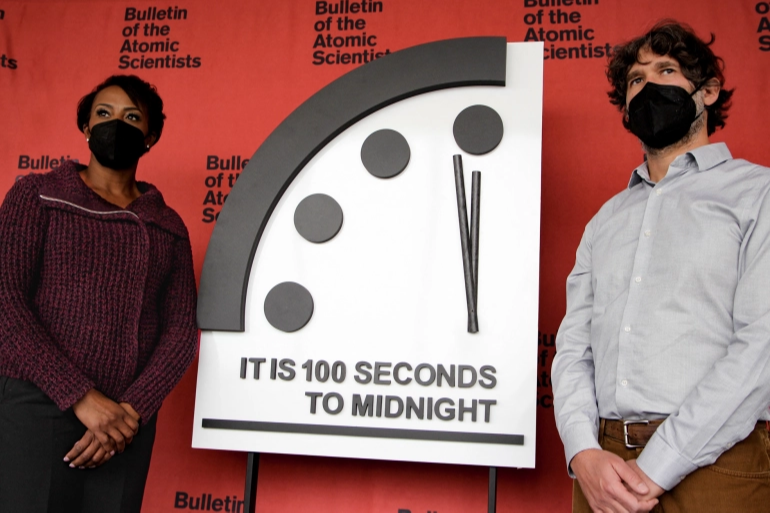
Doomsday Clock stays at 100 seconds to midnight, as scientists warn of threats of nuclear war and climate change. The farthest the clock has been from midnight was 17 minutes, in 1991 [The Hastings Group/ AFP]
Washington, January 21 (RHC)-- The metaphorical Doomsday Clock, which symbolises how close humans are to extinction, has remained alarmingly close to midnight – at 100 seconds – for the third year, with scientists warning against the threats of nuclear war, climate change and deadly diseases.
The Bulletin of the Atomic Scientists, an organisation whose aim is to disseminate information to “reduce man-made threats”, announced the unchanged doomsday warning on Thursday, saying that while 2021 brought some good developments, it also ushered in new challenges.
“The Doomsday Clock is holding steady at 100 seconds to midnight,” said Bulletin president Rachel Bronson. “But steady is not good news. In fact, it reflects the judgement of the [Bulletin] board that we are stuck in a perilous moment, one that brings neither stability nor security.”
The clock had edged to two minutes to midnight in 2018 and then to 100 seconds in 2020. Before that, the closest the clock had been to midnight – a metaphor for an enormous worldwide catastrophe – was at the height of the Cold War in 1953.
Speaking at a virtual event unveiling this year’s clock, Bronson called for action to “ensure a safer and healthier planet.” “We must continue to push the hands of the clock away from midnight,” she said.
The Doomsday Clock was created by the Bulletin in 1947. The organisation had been founded two years earlier by Albert Einstein, J Robert Oppenheimer, Eugene Rabinowitch and University of Chicago scientists.
The farthest the clock has been from midnight was 17 minutes. That was in 1991 when U.S. President George HW Bush and his Soviet counterpart Mikhail Gorbachev signed the Strategic Arms Reduction Treaty (START) to reduce the number of nuclear weapons and ballistic missiles.
The United States and Russia agreed to extend the treaty last year. Still, Sharon Squassoni, co-chair of the Bulletin Science and Security Board, said the agreement is “a small down payment on strategic stability so desperately needed” between Washington and Moscow.
“In the current environment, where we have neither arms race stability nor crisis stability, tensions over Ukraine loom ominously,” Squassoni said. “And with China, efforts to craft a strategic stability are in their infancy. In climate change, rhetorical progress is not yet matched with swift actions. And in the sphere of biosecurity, trends point toward less, rather than more cooperation to identify and manage or mitigate threats.”
World leaders pledged to curb planet-warming emissions at the UN climate summit in Glasgow last year, but experts and scientists at the Bulletin event on Thursday stressed the need for urgent action, rather than verbal promises.
“Each year that human activities continue to dump carbon dioxide into the atmosphere nearly irreversibly ratchets up the total of human suffering and ecosystem destruction arising from global climate disruption,” said Raymond Pierrehumbert, a professor of physics at the University of Oxford.
For her part, Asha M George, executive director of the Bipartisan Commission on Biodefense, an NGO focused on biological threats, said the COVID-19 pandemic exposed humans “vulnerabilities” to biological events.
George sounded the alarm about the possibility of another pandemic after the current one comes to an end, the threats posed by inadequate safety measures at laboratories that work with dangerous pathogens, as well as the perils of biological weapon programmes.
“Countries throughout the world should at least strengthen their ability to monitor for infectious diseases,” she said. “No matter what the source, they should assume that outbreaks that occur in other countries will not stay confined there within their borders or regions. And they must take extraordinary measures now before biological weapons programmes result in biological warfare.”

